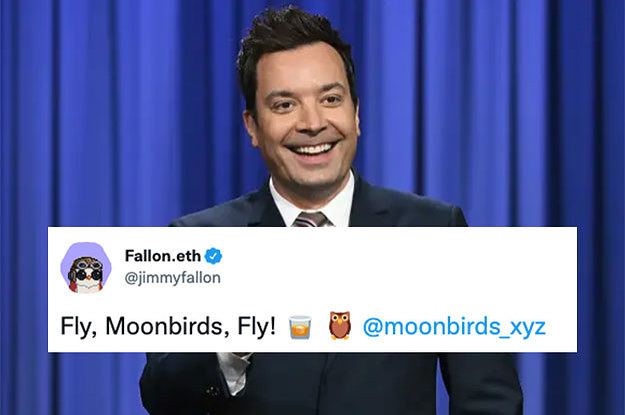
Moonbirds Can’t Remember If It Gave Jimmy Fallon A Free NFT
According to a Moonbirds tweet, there are “no strings attached” to the celebrity gifts, and there’s no problem if they sell their NFT later. But even if there was no requirement that Fallon tweet about it (if indeed he received the NFTs as a gift), the NFTs became much more valuable once he did.
In January, Fallon came under scrutiny for what Vice called a “hallucinogenic” interview segment with Paris Hilton where they both showed and discussed pictures of their Bored Apes. Fans wondered if this constituted a conflict of interest for NBC since Fallon was essentially promoting an investment he owned. Representatives for NBC told the LA Times that this wasn’t a violation of its policies.
The Federal Trade Commission does have a set of social media guidelines for influencers: If you’re doing an ad, you have to make a clear disclaimer. The FTC includes free gifts in this policy, so if a travel blogger is given a free hotel stay or a movie star is given free designer clothes, they need to say so. If Fallon was indeed given a freebie, it would be a violation of the FTC’s rules if he didn’t disclose it. But it’s unlikely Fallon would face any fines. In the past, the FTC has not gone after individual influencers with fines or lawsuits (although it has sent mildly threatening letters to celebrities like Lindsay Lohan and Naomi Campbell) but instead taken action against the companies that placed the ads. A recent Wired article points out that undisclosed ads for NFTs run the risk of potentially offending the SEC as well as the FTC.
“There appears to be a growing trend among celebrities to manipulate their fan base into thinking they have purchased NFTs,” Bonnie Patten, the executive director of consumer advocacy group Truth In Advertising, told BuzzFeed News. “When the reality is that these influencers are deceptively withholding the fact that they have received the cryptoassets for free or as gifts in exchange for promoting the NFTs and the companies behind them. Withholding such material information is illegal, and both the company and the influencer are on the hook for such deception.”
Crypto evangelists point to how NFTs have transparency baked in because of the blockchain. But when the companies making NFTs won’t reveal to fans (or the press when asked directly) about whether or not they are gifting to celebrities, that isn’t transparent at all. It matters to fans and potential buyers whether or not Jimmy Fallon actually paid for his own NFT — they have a right to know if the hype is real or manufactured.
This content was originally published here.


